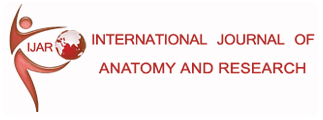IJAR.2017.124
Type of Article: Original Research
Volume 5; Issue 1 (March 2017)
Page No.: 3625-3628
DOI: https://dx.doi.org/10.16965/ijar.2017.124
QUIZ AS A TOOL FOR PART COMPLETION EXAM IN ANATOMY
Priya P Roy *1, Pratibha P Patil 2, Doshi M A3, Ambali M P 4, Kumar Sai Sailesh 5.
*1 Associate Professor, Department of Anatomy, Krishna Institute of Medical Sciences, Karad, Maharashtra, India.
2 M.Sc, Department of Anatomy, Krishna Institute of Medical Sciences, Karad, Maharashtra, India.
3 Professor & HOD, Department of Anatomy, Krishna Institute of Medical Sciences, Karad, Maharashtra, India.
4 Professor, Department of Anatomy, Krishna Institute of Medical Sciences, Karad, Maharashtra, India.
5 Assistant Professor, Department of Physiology, Little Flower Institute of Medical Sciences and Research, Angamaly, kerala, India.
Corresponding author: Dr. Priya P Roy, Associate Professor, Department of Anatomy, Krishna Institute of Medical Sciences, Karad, Maharashtra, India. E-Mail: priyaproy4@gmail.com
ABSTRACT
Introduction: Anatomy has always been one of the Basic sciences of Medical sciences. Anatomical knowledge is traditionally tested by means of summative examination, providing information for pass/fail decisions. The present study was aimed to observe effectiveness of anatomy quiz for improvement of academic performance in first MBBS students.
Materials and Methods: After completion of the syllabus for the academic years, students were trained regarding quiz and three quizzes were conducted for students. Participants were requested to give their opinion about the 10 statements pertaining to the Quiz which were conducted in the department of Anatomy.
Results: We have observed positive response from most of the students regarding effectiveness of quiz. Further those who performed quiz very well also performed the same in the university examinations.
Conclusion: Most of the students agreed and supported conduction of quiz in anatomy for better retrieval skills. We recommend further studies in this area to recommend adoption of the quiz in the curriculum.
Key words: Anatomy quiz, Students feedback, Academic performance.
REFERENCES
- Karpicke JD, Roediger HL 3rd. Is expanding retrieval a superior method for learning text materials? Mem Cognit. 2010;36:116–124.
- Marsh KR, Giffin BF, Lowrie DJ Jr. Medical student retention of embryonic development: impact of the dimensions added by multimedia tutorials. Anat Sci Educ. 2008;1:252–257.
- Bergman EM, Prince KJ, Drukker J, van der Vleuten CP, Scherpbier AJ. How much anatomy is enough? Anat Sci Educ. 2008;1:184–188.
- Jessica M. Logan, Andrew J. Thompson and David W. Marshak. Testing to enhance retention in human anatomy. Anat Sci Educ. 2011;4(5):243–248.
- Smith CF, Mathias H. An investigation into medical students’ approaches to anatomy learning in a systems-based prosection course. Clin Anat. 2007;20:843–8.
- Eizenberg N. Applying student learning research to practice. In: Bowden JA, editor. Student learning: research into practice. Parkville: Centre of the Study of Higher Education; 1986. p. 21-60.
- McLean M. Introducing a reward system in assessment in histology: a comment on the learning strategies it might engender. BMC Med Educ. 2001;1:7.
- Mattick K, Knight L. High-quality learning: harder to achieve than we think? Med Educ. 2007;41:638–44.
- Ana Poljičanin, Ana Čarić, Katarina Vilović, Vana Košta, Maja Marinović Guić, Jure Aljinović, and Ivica Grković. Daily Mini Quizzes as Means for Improving Student Performance in Anatomy Course. Croat Med J. 2009 Feb;50(1):55–60.
- Fenderson BA, Fishback J, Damjanov I. Weekly mini-examinations (quizzes) based on extended-matching questions as a means for monitoring medical student performance. Croat Med J. 1996;37:283–7.
- Karpicke JD, Roediger HL. The critical importance of retrieval for learning. Science. 2008;319:966–8.
- Roediger HL, Karpicke JD. Test-enhanced learning: taking memory tests improves long-term retention. Psychol Sci. 2006;17:249–55.
- Karpicke JD, Roediger HL. Repeated retrieval during learning is the key to long-term retention. J Mem Lang. 2007;57:151–62.
- Rolfe I, McPherson J. Formative assessment: how am I doing? Lancet. 1995;345:837–39.
- Chan JCK. Long-term effects of testing on the recall of nontested materials. Memory. 2010;18:49–57.
- Butler AC, Karpicke JD, Roediger HL. Correcting a metacognitive error: feedback enhances retention of low confidence correct responses. J Exp Psychol Learn Mem Cogn. 2008;34:918–28.
- Leonieke N. Palmen,corresponding author Marc A.T.M. Vorstenbosch, Esther Tanck, and Jan G.M. Kooloos. What is more effective: a daily or a weekly formative test? Perspect Med Educ. 2015 Apr;4(2):73–78.
- Lucas StetzikEmail author, Anthony Deeter, Jamie Parker and Christine Yukech. Puzzle-based versus traditional lecture: comparing the effects of pedagogy on academic performance in an undergraduate human anatomy and physiology II lab. BMC Medical Education. 2015;15:107.








